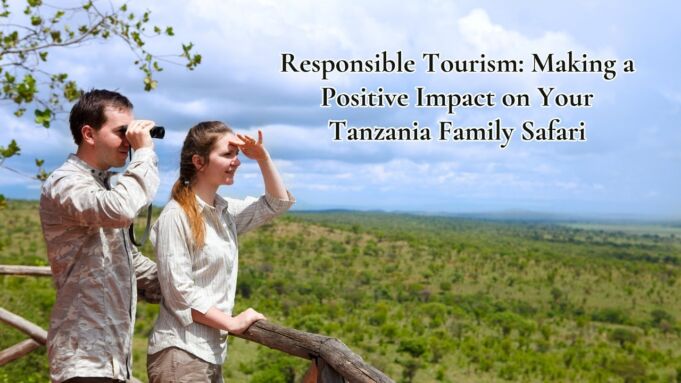Imagine gazing across the endless Serengeti grasslands, watching mighty elephants and majestic giraffes roam in the distance. A family safari in Tanzania creates breathtaking memories to cherish forever. You’ll be amazed by dramatic landscapes, exotic wildlife, and a rich cultural heritage as you connect with nature and each other.
However, experiencing these natural wonders carries a responsibility to practice responsible tourism. From choosing eco-lodges to supporting artisans by buying handcrafted souvenirs, you can create priceless family memories while preserving Tanzania’s heritage for the future. By prioritizing ethical practices, not only will you create priceless family memories, but you will also preserve Tanzania’s heritage for future generations. Let this be an inspiration for a new chapter of travel where every step taken in the wilds of Tanzania helps preserve its beauty for future adventurers.
Understanding the Concept of Family Safari in Tanzania
Tanzania is renowned for its breathtaking landscapes, diverse wildlife, and vibrant cultures, making it an ideal destination for a family safari. A Tanzania family safari typically involves exploring national parks, encountering wildlife, and immersing in the local culture.
Importance of Responsible Tourism in Tanzania
Preserving Wildlife and Ecosystems
Responsible tourism in Tanzania is paramount for the preservation of its rich biodiversity and intricate ecosystems. The country’s diverse landscapes, from the Serengeti plains to the lush rainforests of the Eastern Arc Mountains, are home to an astonishing array of flora and fauna. However, unchecked tourism activities can pose significant threats to these delicate ecosystems.
By embracing responsible tourism practices, visitors can minimize their environmental impact and actively contribute to conservation efforts. This adherence includes following guidelines for waste management, water conservation, and sustainable energy use. Additionally, tourists can support conservation organizations and wildlife sanctuaries dedicated to protecting endangered species and their habitats.
Empowering Local Communities
Beyond its natural wonders, Tanzania is a land of vibrant cultures and diverse ethnic groups, each with its own unique traditions and customs. Responsible tourism catalyzes empowering local communities by providing economic opportunities and preserving cultural heritage. Supporting locally-owned businesses, such as family-run guesthouses and artisan cooperatives, allows tourists to directly contribute to the livelihoods of rural communities.
Furthermore, hiring indigenous guides and participating in cultural experiences fosters mutual respect and understanding between visitors and residents. By embracing responsible tourism, travelers can become agents of positive change, driving sustainable socio-economic development across Tanzania.
Supporting Sustainable Development
Responsible tourism is intrinsically linked to the principles of sustainable development, advocating for practices that balance environmental conservation with economic growth and social equity. In Tanzania, tourism serves as a vital engine for economic prosperity, generating revenue, creating jobs, and stimulating local industries. By investing in eco-friendly initiatives and community projects, tourists can contribute to the long-term well-being of Tanzania and its people.
This includes supporting initiatives focused on renewable energy, wildlife conservation, and community-based tourism. By promoting environmental stewardship, economic resilience, and social inclusivity, responsible tourism paves the way for a brighter and more sustainable future for Tanzania and its inhabitants.
Tips for Practicing Responsible Tourism on a Family Safari
Tanzania beckons families with a safari adventure beyond imagination – majestic wildlife, breathtaking natural beauty, and a vibrant cultural heritage. However, it’s essential to prioritize responsible tourism practices to minimize your impact on the environment and support local communities. Here are some tips to ensure your family safari is both memorable and sustainable:
Choosing Eco-Friendly Accommodations
Selecting eco-friendly accommodations is a crucial step in practicing responsible tourism. Look for lodges and camps prioritizing sustainability and eco-friendly practices, such as utilizing renewable energy sources, implementing waste reduction strategies, and promoting water conservation efforts. Opting for environmentally-conscious accommodations minimizes your carbon footprint and supports businesses committed to protecting Tanzania’s natural resources.
Opting for Ethical Wildlife Encounters
When planning wildlife encounters during your family safari, prioritize ethical tourism practices that prioritize animal welfare and conservation. Support wildlife sanctuaries and conservation initiatives that provide ethical and responsible interactions with wildlife. Avoid activities that involve captive or exploited animals, such as elephant rides or photo opportunities with drugged animals. By choosing ethical wildlife encounters, you can contribute to the protection of Tanzania’s precious wildlife and promote sustainable tourism practices.
Respecting Local Culture and Customs
Respecting local culture and customs is essential when visiting Tanzania. Take the time to learn about the customs, traditions, and etiquette of the communities you will encounter during your safari. Respect cultural sensitivities, dress modestly, and seek permission before photographing people or sacred sites. Engage with local communities in a respectful and meaningful way, fostering mutual understanding and appreciation for Tanzania’s diverse cultural heritage.
Minimizing Environmental Impact
Minimizing your environmental impact is key to practicing responsible tourism on a family safari. Take proactive steps to reduce your carbon footprint by adopting eco-friendly behaviors such as minimizing waste, conserving water, and practicing responsible energy consumption. Follow Leave No Trace principles when exploring Tanzania’s natural areas, and refrain from littering or disturbing natural habitats. By minimizing your environmental impact, you can help preserve Tanzania’s pristine landscapes for future generations to enjoy.
Supporting Conservation Efforts
Contributing to wildlife conservation and habitat restoration projects is a meaningful way to engage in responsible tourism during your family safari. In addition to minimizing your environmental impact, consider actively supporting conservation organizations through donations, volunteering opportunities, or participating in eco-tours led by reputable conservation organizations. By directly contributing to conservation efforts, you can make a tangible difference in preserving Tanzania’s biodiversity and protecting its natural heritage for future generations to enjoy.
Ensuring Safety and Security
While embarking on a family safari in Tanzania promises unforgettable adventures, prioritizing your family’s safety and well-being is paramount. Before traveling, stay informed about current travel advisories and health recommendations for Tanzania. Ensure that everyone in your family receives necessary vaccinations and preventive medications to protect against common tropical diseases.
When selecting tour operators and guides, prioritize reputable companies with experienced guides who prioritize safety protocols and adhere to ethical standards. By taking proactive steps to ensure safety and security, you can enjoy your family safari with peace of mind.
Final Thoughts
As your Tanzania family safari ends, think about the experiences and encounters you’ve had. Responsible tourism can make a big difference. Your choices matter. They support conservation efforts, empower local communities, and embrace sustainable practices. Your choices as a responsible traveler help preserve Tanzania’s natural heritage and cultural diversity.
By connecting more with the land and its people, your family safari becomes more than a vacation. It becomes a journey of stewardship and appreciation for the wonders of our planet. As you leave Tanzania, take with you the memories of your adventures. Know that your actions have had a positive impact. You leave behind a legacy of responsible tourism for future generations to cherish.
FAQs
How can our family ensure our Tanzania safari has a positive impact?
Look for tour operators that actively practice responsible tourism. This includes working with local communities. It involves supporting conservation efforts, employing locals, and educating guests. Ask about their sustainability policies and community partnerships. Travel in small groups, and be respectful during wildlife encounters.
What are some simple ways we can be responsible tourists on our Tanzania safari?
Reduce plastic waste by bringing reusable water bottles and not using single-use plastics. Support local merchants and buy souvenirs directly from local artisans. Learning basic Swahili phrases can facilitate respectful interaction with locals. Obey all park rules and be attentive to your guide so as not to disturb wildlife.
What cultural experiences would allow our family to engage respectfully with locals in Tanzania?
Consider opportunities like visiting a Maasai village to learn about their culture, taking a walking tour in a town with a local guide, or booking a cooking class to prepare traditional Tanzanian dishes. Be sure to ask permission before photographing locals. Purchasing handmade crafts directly supports artisans.
















[…] The calving grounds, especially in regions like the southern Serengeti and Ndutu, offer ideal conditions with short grasses that make it easier for the calves to evade predators. This time is not only vital for the survival and growth of the wildebeest population but also attracts a variety of predators, making it a dynamic and dramatic period in the Tanzanian ecosystem. […]
Comments are closed.